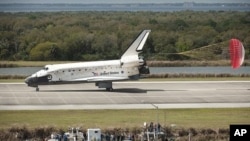The U.S. space shuttle Discovery and its crew ended a 13-day mission and a journey of more than 8 million kilometers Wednesday at NASA's Kennedy Space Center in Florida. This is the end of a mission and the end of a storied career.
"And nose gear touchdown and the end of a historic journey," said the NASA announcer. "And to the ship that has led the way time and time again, we say, 'Farewell, Discovery.'"
Discovery ended its 27-year career with a smooth touchdown under clear skies. Soon after landing, the six astronauts of Discovery's final mission greeted NASA officials on the runway at Kennedy Space Center.
The astronauts in blue flight suits shook hands and shared hugs with officials, including NASA administrator Charles Bolden and Kennedy Space Center director Bob Cabana, both former astronauts themselves.
Bolden thanked the crew for what he called "an absolutely incredible flight."
"If my numbers are correct, it's the 39th flight on Discovery," said Bolden. "Discovery has a very special place for me and for Bob Cabana over here because we both had an opportunity to fly on it twice, and so this is very bittersweet for all of us."
The commander of Discovery's ultimate mission, Steve Lindsey, said the fleet's longest-serving shuttle was back on the ground in the same condition after its final mission as it was after its first mission. That news was particularly welcome, considering that Discovery's blastoff into space was delayed for several months after engineers discovered cracks in support beams on the shuttle's fuel tank.
Lindsey said not a single system had any problem.
"If you think about a vehicle that's 26 or 27-years-old, been flying for that long, to come back perfect - I have never seen an airplane be able to do that," said Lindsey.
NASA is retiring its shuttle fleet this year and is encouraging the development of commercial human spaceflight vehicles.
As for Discovery, after a high-flying career that included logging 238 million kilometers in space, the shuttle will retire to a museum.
Commander Lindsey reflected on the end of the era.
"As Charlie mentioned, it's a pretty bittersweet moment for all of us," he said. "As the minutes pass, I'm actually getting sadder and sadder about this being the last flight, and I know all the folks involved in the shuttle program feel the same way."
For its last mission, Discovery delivered Robonaut 2, the first human-like robot in space and now a permanent resident of the International Space Station. It also carried a pressurized module that can host experiments in fluid physics, biotechnology and other areas. During the mission, the space station crew and the shuttle crew worked together to reconfigure the spacelab so that even more research can be conducted there.
Speaking at a news conference after the landing, the space shuttle launch director, Mike Leinbach, said more than 100 percent of the mission's objectives were accomplished. He credited the crews on the ground and in orbit and the shuttle itself.
"We wanted to go out on a high note, and Discovery has done that," said Leinbach. "We couldn't ask for more."
Next up is the launch of the space shuttle Endeavour, which is gearing up for its final mission. Endeavour is targeted to lift off April 19.




